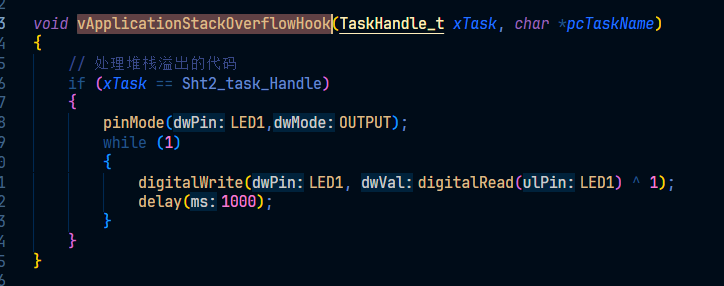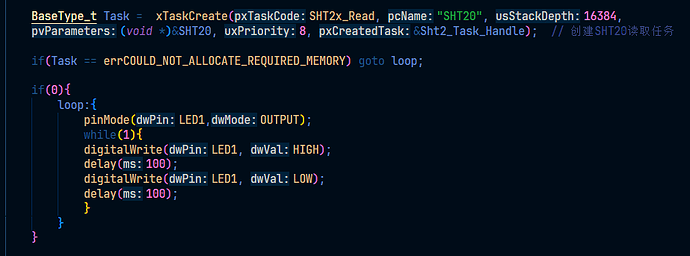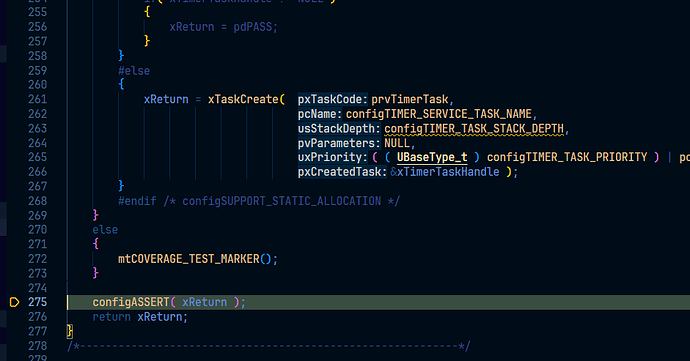When I attempted to develop my MCU using the gccarm toolchain, gcc exhibited an unexpected behavior that resulted in a bug I spent the entire evening searching for.
here is the fuction source code:
void SHT2x_Read(void *pvParameters){
SHT2x_Struct *sht2x = (SHT2x_Struct *)pvParameters;
TwoWire SHT20_Wire = TwoWire(sht2x->SDA_Pin, sht2x->SCL_Pin);
SHT2x sht2x_sensor;
sht2x_sensor.begin(&SHT20_Wire);
while(1){
sht2x_sensor.read();
float SHT_Temp = sht2x_sensor.getTemperature();
float SHT_Humi = sht2x_sensor.getHumidity();
if(xSemaphoreTake(xMutex, 1000) == pdTRUE){
//do something
SHT_msg.SHT_Humi = SHT_Humi;
SHT_msg.SHT_Temp = SHT_Temp;
xSemaphoreGive(xMutex);
}
vTaskDelay(1000);
}
}
When I didn’t add the ‘static’ keyword to the variable SHT20_Wire, the compiler produced an unexpected behavior.
This is the assembly code generated during compilation without the ‘static’ keyword.
0x08006f54: 30 b5 push {r4, r5, lr}
0x08006f56: c3 b0 sub sp, #268 ; 0x10c
0x08006f58: 42 78 ldrb r2, [r0, #1]
0x08006f5a: 01 78 ldrb r1, [r0, #0]
0x08006f5c: 09 a8 add r0, sp, #36 ; 0x24
0x08006f5e: 01 f0 93 fc bl 0x8008888 <_ZN7TwoWireC2Emm>
0x08006f62: 68 46 mov r0, sp
0x08006f64: 03 f0 ca fc bl 0x800a8fc <_ZN5SHT2xC2Ev>
0x08006f68: 09 a9 add r1, sp, #36 ; 0x24
0x08006f6a: 68 46 mov r0, sp
0x08006f6c: 03 f0 a6 fd bl 0x800aabc <_ZN5SHT2x5beginEP7TwoWire>
0x08006f70: 0d e0 b.n 0x8006f8e <_Z10SHT2x_ReadPv+58>
0x08006f72: 11 4b ldr r3, [pc, #68] ; (0x8006fb8 <_Z10SHT2x_ReadPv+100>)
0x08006f74: 5d 60 str r5, [r3, #4]
0x08006f76: 1c 60 str r4, [r3, #0]
0x08006f78: 00 23 movs r3, #0
0x08006f7a: 1a 46 mov r2, r3
0x08006f7c: 19 46 mov r1, r3
0x08006f7e: 0f 48 ldr r0, [pc, #60] ; (0x8006fbc <_Z10SHT2x_ReadPv+104>)
0x08006f80: 00 68 ldr r0, [r0, #0]
0x08006f82: fe f7 46 fa bl 0x8005412 <xQueueGenericSend>
0x08006f86: 4f f4 7a 70 mov.w r0, #1000 ; 0x3e8
0x08006f8a: ff f7 a3 f8 bl 0x80060d4 <vTaskDelay>
0x08006f8e: 68 46 mov r0, sp
0x08006f90: 03 f0 28 fe bl 0x800abe4 <_ZN5SHT2x4readEv>
0x08006f94: 68 46 mov r0, sp
0x08006f96: 03 f0 17 fd bl 0x800a9c8 <_ZN5SHT2x14getTemperatureEv>
0x08006f9a: 04 46 mov r4, r0
0x08006f9c: 68 46 mov r0, sp
0x08006f9e: 03 f0 2f fd bl 0x800aa00 <_ZN5SHT2x11getHumidityEv>
0x08006fa2: 05 46 mov r5, r0
0x08006fa4: 4f f4 7a 71 mov.w r1, #1000 ; 0x3e8
0x08006fa8: 04 4b ldr r3, [pc, #16] ; (0x8006fbc <_Z10SHT2x_ReadPv+104>)
0x08006faa: 18 68 ldr r0, [r3, #0]
0x08006fac: fe f7 22 fc bl 0x80057f4 <xQueueSemaphoreTake>
0x08006fb0: 01 28 cmp r0, #1
0x08006fb2: de d0 beq.n 0x8006f72 <_Z10SHT2x_ReadPv+30>
0x08006fb4: e7 e7 b.n 0x8006f86 <_Z10SHT2x_ReadPv+50>
0x08006fb6: 00 bf nop
0x08006fb8: 80 04 lsls r0, r0, #18
0x08006fba: 00 20 movs r0, #0
0x08006fbc: 7c 04 lsls r4, r7, #17
0x08006fbe: 00 20 movs r0, #0
And this is the assembly code generated when the ‘static’ keyword is added.
0x08006f90: 30 b5 push {r4, r5, lr}
0x08006f92: 8b b0 sub sp, #44 ; 0x2c
0x08006f94: 1d 4b ldr r3, [pc, #116] ; (0x800700c <_Z10SHT2x_ReadPv+124>)
0x08006f96: 1b 68 ldr r3, [r3, #0]
0x08006f98: 13 f0 01 0f tst.w r3, #1
0x08006f9c: 07 d0 beq.n 0x8006fae <_Z10SHT2x_ReadPv+30>
0x08006f9e: 01 a8 add r0, sp, #4
0x08006fa0: 03 f0 dc fc bl 0x800a95c <_ZN5SHT2xC2Ev>
0x08006fa4: 1a 49 ldr r1, [pc, #104] ; (0x8007010 <_Z10SHT2x_ReadPv+128>)
0x08006fa6: 01 a8 add r0, sp, #4
0x08006fa8: 03 f0 b8 fd bl 0x800ab1c <_ZN5SHT2x5beginEP7TwoWire>
0x08006fac: 19 e0 b.n 0x8006fe2 <_Z10SHT2x_ReadPv+82>
0x08006fae: 42 78 ldrb r2, [r0, #1]
0x08006fb0: 01 78 ldrb r1, [r0, #0]
0x08006fb2: 17 48 ldr r0, [pc, #92] ; (0x8007010 <_Z10SHT2x_ReadPv+128>)
0x08006fb4: 01 f0 98 fc bl 0x80088e8 <_ZN7TwoWireC2Emm>
0x08006fb8: 14 4b ldr r3, [pc, #80] ; (0x800700c <_Z10SHT2x_ReadPv+124>)
0x08006fba: 01 22 movs r2, #1
0x08006fbc: 1a 60 str r2, [r3, #0]
0x08006fbe: 15 48 ldr r0, [pc, #84] ; (0x8007014 <_Z10SHT2x_ReadPv+132>)
0x08006fc0: 03 f0 6e fe bl 0x800aca0 <atexit>
0x08006fc4: eb e7 b.n 0x8006f9e <_Z10SHT2x_ReadPv+14>
0x08006fc6: 14 4b ldr r3, [pc, #80] ; (0x8007018 <_Z10SHT2x_ReadPv+136>)
0x08006fc8: 5d 60 str r5, [r3, #4]
0x08006fca: 1c 60 str r4, [r3, #0]
0x08006fcc: 00 23 movs r3, #0
0x08006fce: 1a 46 mov r2, r3
0x08006fd0: 19 46 mov r1, r3
0x08006fd2: 12 48 ldr r0, [pc, #72] ; (0x800701c <_Z10SHT2x_ReadPv+140>)
0x08006fd4: 00 68 ldr r0, [r0, #0]
0x08006fd6: fe f7 1c fa bl 0x8005412 <xQueueGenericSend>
0x08006fda: 4f f4 7a 70 mov.w r0, #1000 ; 0x3e8
0x08006fde: ff f7 79 f8 bl 0x80060d4 <vTaskDelay>
0x08006fe2: 01 a8 add r0, sp, #4
0x08006fe4: 03 f0 2e fe bl 0x800ac44 <_ZN5SHT2x4readEv>
0x08006fe8: 01 a8 add r0, sp, #4
0x08006fea: 03 f0 1d fd bl 0x800aa28 <_ZN5SHT2x14getTemperatureEv>
0x08006fee: 04 46 mov r4, r0
0x08006ff0: 01 a8 add r0, sp, #4
0x08006ff2: 03 f0 35 fd bl 0x800aa60 <_ZN5SHT2x11getHumidityEv>
0x08006ff6: 05 46 mov r5, r0
0x08006ff8: 4f f4 7a 71 mov.w r1, #1000 ; 0x3e8
0x08006ffc: 07 4b ldr r3, [pc, #28] ; (0x800701c <_Z10SHT2x_ReadPv+140>)
0x08006ffe: 18 68 ldr r0, [r3, #0]
0x08007000: fe f7 f8 fb bl 0x80057f4 <xQueueSemaphoreTake>
0x08007004: 01 28 cmp r0, #1
0x08007006: de d0 beq.n 0x8006fc6 <_Z10SHT2x_ReadPv+54>
0x08007008: e7 e7 b.n 0x8006fda <_Z10SHT2x_ReadPv+74>
0x0800700a: 00 bf nop
0x0800700c: 8c 04 lsls r4, r1, #18
0x0800700e: 00 20 movs r0, #0
0x08007010: 90 04 lsls r0, r2, #18
0x08007012: 00 20 movs r0, #0
0x08007014: 31 6f ldr r1, [r6, #112] ; 0x70
0x08007016: 00 08 lsrs r0, r0, #32
0x08007018: 84 04 lsls r4, r0, #18
0x0800701a: 00 20 movs r0, #0
0x0800701c: 80 04 lsls r0, r0, #18
0x0800701e: 00 20 movs r0, #0
I’m not an expert in assembly, but I can see that when the ‘static’ keyword is not added, the address of the variable SHT20_Wire is not stored in the stack. This resulted in unexpected errors in my program.
My platfrom:Stm32F103ZET6
platforimio.ini:
; PlatformIO Project Configuration File
;
; Build options: build flags, source filter
; Upload options: custom upload port, speed and extra flags
; Library options: dependencies, extra library storages
; Advanced options: extra scripting
;
; Please visit documentation for the other options and examples
; https://docs.platformio.org/page/projectconf.html
[env:genericSTM32F103ZE]
platform = ststm32
board = genericSTM32F103ZE
framework = arduino
upload_protocol = cmsis-dap
upload_speed = 1000000
debug_tool = cmsis-dap
lib_deps =
stm32duino/STM32duino FreeRTOS@^10.3.2
olikraus/U8g2@^2.35.4
adafruit/Adafruit BusIO@^1.14.1
robtillaart/SHT2x@^0.3.0
I consulted a friend who has a better understanding of gcc, and he mentioned that according to gcc standards, any variable whose address is taken should not be optimized to the extent of not storing its address in the stack. I was quite puzzled by this as well. I’m not sure why gccarm would make such an optimization. Perhaps it’s due to my version being too low? Or maybe it’s an optimization point documented in the gcc documentation? I hope someone can provide an answer to my question.
Thanks ![]()









